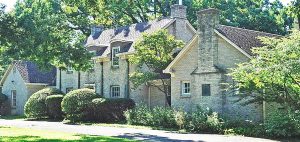Landmark agreement clears way for Native American center in Glen Ellyn
September 30, 2023
The limestone-clad McKee House, built during the Great Depression by Civilian Conservation Corps workers as part of the Works Progress Administration, will be restored and serve as museum, library and cultural center devoted to Native Americans. (Forest Preserve District of DuPage County photo)
The site of a onetime Native American village in Glen Ellyn will now be home to a museum, library and cultural center devoted to indigenous Americans.
The Village of Glen Ellyn and the Forest Preserve District of DuPage County recently signed an agreement to allow the preservation of a historic house at Churchill Woods and the creation of the Native American Cultural and Environmental Center.
Operated by The Midwest SOARRING Foundation, The center will be located in the architecturally and historically significant McKee House, a limestone-brick facility built during the Great Depression by Civilian Conservation Corps workers as part of the Works Progress Administration.
The group seeks to raise $4 million in private donations for the center, which is expected to open in 2025.
The project includes roof repair, removal of lead paint and asbestos, remediation of mold, bringing utilities up to current standards, install new plumbing and restore the stone exterior.
Situated along St. Charles Road in Glen Ellyn, the historic residence of the first director of the Forest Preserve will be restored and repurposed. The Center at Churchill Woods will house a Native American museum and a library as well as education and meeting rooms. The grounds will feature public gardens and a traditional longhouse.
This project brings together the past and the present, reuniting Native Americans with an important Midwestern site as Churchill Woods was home to a large Potawatomi village dating to the late 1700s.
The site also is home to Babcock Grove and the Churchill Prairie Nature Preserve and is surrounded by a native hardwood forest populated with trees that are more than 150 years old.
A community of about 500 Potawatomi Indians lived in present-day Churchill Woods as they waited for the U.S. government to send them west of the Mississippi River, as mandated by the 1833 Treaty of Chicago.
The treaty provided for the United States’ acquisition and settlement of the last remaining American Indian land in Illinois, including land that would eventually become DuPage County.
“When the French explorers and missionaries came to ‘Illinois Country’ in 1675, this land was rich with game — bear, deer, wolf, bison, beaver, raccoon and squirrel,” said Joseph Standing Bear Schranz of Midwest SOARING. “The varied Native tribes hunted, fished, built their homes of cedar and bark, traveled to visit relatives and gathered for ceremonies. They lived in harmony with the earth in a more natural, simpler world. Each tribe struggled with political and economic forces in their own territory before they were relocated against their will to land west of the Mississippi in 1835.”
In 1834, Winslow and Mercy Churchill settled on the western edge of today’s Churchill Woods after leaving Syracuse, N.Y. in search of rich farmland after their own farm was purchased for the Erie Canal.
The Churchills became prosperous farmers who earned a prominent reputation among the citizens of developing Glen Ellyn and Lombard as well as Milton Township, which they helped to establish. Their combined claims stretched from present-day Route 53 on the east, North Avenue on the north, Main Street in Glen Ellyn on the west and Crescent Boulevard on the south — all bought for $1.25 an acre.
Babcock Grove is named for brothers Ralph and Morgan Babcock, two of the county’s first settlers of European descent. Some of the grove’s white oaks date back to the 1830s, a time when settlers left seedlings untouched as they logged mature oaks for new plank roads (some say Deacon Winslow Churchill complained about the noise from the horse-drawn traffic that clattered over the planks on St. Charles Road keeping him awake at night).
The Forest Preserve District acquired the first portion of Churchill Woods from Eliza Churchill in 1935. Its final significant acquisition, which included the 65-acre prairie on the north side of St. Charles Road, was in 1969.
For more information on Midwest SOARRING, visit https://www.midwestsoarring.org
Establishing The Center at Churchill Woods will depend on the generosity of private donations which can be made at https://fundthecenter.org/offline-donation/



